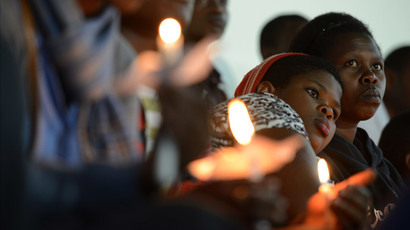- Get link
- X
- Other Apps
Featured Post
Posted by
Maendeleo Vijijini
on
- Get link
- X
- Other Apps
Rwandan prosecutors are calling on their European counterparts to try genocide cases themselves if they are unable to extradite wanted persons back to the African state for trial.
The move follows a Swedish court’s decision last week to sentence a Rwandan national to life in prison for his role in the 1994 genocide against the Tutsi population.
Claver Berinkindi was handed a life sentence by the Stockholm District Court after he was found guilty of leading a series of killings in the south of Rwanda. Witnesses said he had commanded a militia and organized raids where thousands of Tutsis were killed.
Berinkindi, 61, was not extradited to Rwanda to face trial as he is also a Swedish citizen, the AP reports.
Rwanda’s government said there are hundreds of similar pending cases or arrest warrants for alleged participation in the mass genocide for suspects currently residing in Europe.
Some 1,1000 fugitives have been tracked by the country’s Genocide Fugitive Tracking Unit (GFTU), with indictments and arrest warrants being issued to over 130 of the suspects.
The GFTU reported that the majority of the fugitives are in France, Belgium, the Netherlands, Italy, and Nordic countries, according to All Africa.
Augustin Nkusi, spokesperson for the national prosecution body in Rwanda, said the latest sentencing in Sweden should set an example for other European countries.
“Twenty-two years down the road, it should be made clear to genocide suspects that they cannot escape justice forever,” he told the news site. “We still have many genocide suspects in Europe roaming freely even with warrants for their arrest.”
European states have refused to extradite genocide suspects in the last two decades over concerns that those involved might not get a fair trial in their home country, prompting Rwanda’s requests for the accused to be tried in Europe instead.
Proceedings against two former Rwandan mayors began last week in Paris for their role in the genocide, but Kigali says more needs to be done to bring those accused to justice.
In 2010, the United Nations Mechanism for International Criminal Tribunals (UNMICT) was set up to take over and continue the functions of the earlier UN body, the International Criminal Tribunal for Rwanda (ICTR).
UNMICT, which has overseen the prosecution of 90 people involved in the genocide, says it retains jurisdiction over those who are “most responsible for committing the gravest crimes” during the atrocities of 1994.
In one case, Yvonne Ntacyobatabara Basebya, who was member of Hutu extremist party, the Coalition for the Defence of the Republic (CDR), was arrested and tried at The Hague for leading a group of young men to capture Tutsis and moderate Hutus in her neighborhood.
CREDIT: RTClaver Berinkindi was handed a life sentence by the Stockholm District Court after he was found guilty of leading a series of killings in the south of Rwanda. Witnesses said he had commanded a militia and organized raids where thousands of Tutsis were killed.
Berinkindi, 61, was not extradited to Rwanda to face trial as he is also a Swedish citizen, the AP reports.
Some 1,1000 fugitives have been tracked by the country’s Genocide Fugitive Tracking Unit (GFTU), with indictments and arrest warrants being issued to over 130 of the suspects.
The GFTU reported that the majority of the fugitives are in France, Belgium, the Netherlands, Italy, and Nordic countries, according to All Africa.
Real Rwandan genocide & brainwashing of the Western mind
“Twenty-two years down the road, it should be made clear to genocide suspects that they cannot escape justice forever,” he told the news site. “We still have many genocide suspects in Europe roaming freely even with warrants for their arrest.”
European states have refused to extradite genocide suspects in the last two decades over concerns that those involved might not get a fair trial in their home country, prompting Rwanda’s requests for the accused to be tried in Europe instead.
Proceedings against two former Rwandan mayors began last week in Paris for their role in the genocide, but Kigali says more needs to be done to bring those accused to justice.
In 2010, the United Nations Mechanism for International Criminal Tribunals (UNMICT) was set up to take over and continue the functions of the earlier UN body, the International Criminal Tribunal for Rwanda (ICTR).
UNMICT, which has overseen the prosecution of 90 people involved in the genocide, says it retains jurisdiction over those who are “most responsible for committing the gravest crimes” during the atrocities of 1994.
In one case, Yvonne Ntacyobatabara Basebya, who was member of Hutu extremist party, the Coalition for the Defence of the Republic (CDR), was arrested and tried at The Hague for leading a group of young men to capture Tutsis and moderate Hutus in her neighborhood.



Comments
Post a Comment